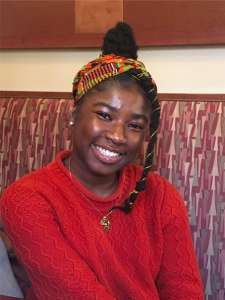By: Faye Davis
Edited by: Bridget Salice
The first thing I notice about Mimi is her smile. She can’t stop smiling as she talks, her words flowing eloquently and with purpose. The second thing I notice is her hair. She has it wrapped in a bun on the top of her head, accompanied with a vibrant orange, green, and brown hair wrap. Her bangs are adorned in a gold ribbon. Mimi Akomeha has the kind of confidence and vibrancy integrated into her own style that many girls dream of. And thanks to her proud Ghanaian upbringing, she has always emulated this confidence.
Her parents are both from Ghana, a country located in West Africa, wedged along the Gulf of Guinea. Her father came over to the United States first before getting a Visa to bring her mother, brothers, and sisters to the U.S. Although Mimi has lived in the U.S. all her life, she still says that Ghana feels like home. She says this has also influenced her style greatly. “When you go to Ghana, the colors are so vibrant, and so it has inspired me to be vibrant both physically and emotionally.” She says she loves to emulate that with her personality. The vibrant colors of Ghana always remind her to be happy and to stay positive.
As a child, Mimi’s parents worked to incorporate African culture into the upbringing of their children. “My dad taught us English, and my mom taught us Twi.” Twi is one of the main dialects in Ghana. “As a child growing up, I would speak fluently in both, but when I got into the school system, they took the Twi out of me, because they wanted me to be focused… I was confusing some of the dialects between Twi and English, so they wanted to break that dialect that I was growing into. This sort of hindered my growth… it made me very confused. They put me into an ESL class because of that. I was kind of made to feel like I was a little slow… even though I know now I wasn’t, but it definitely slowed my process in elementary school.” She says that she was inspired to pick up Twi in high school again since she has always been very passionate about her culture and heritage. She now speaks fluently in Twi.
Mimi has visited Ghana once before, where she stayed with family in Kumasi. In Ghana, during the windy season, people wear long skirts down to their heels. “A lot of the scarves are made out of Kente print. Most of the clothing is all handmade, everyone makes their own clothes. Many people from Ghana are seamstresses and tailors – both my parents are as well. Everybody had to learn how to make their own clothes because it was either that or don’t look nice.”
Another item of clothing that Mimi appreciates are the Duko – the wraps that women will wear in their hair. “There’s a lot of dust on the floor, so to protect their hair women will wear these. That’s honestly why I wear my hair in wraps, because of the inspiration that I saw in Ghana. And it’s so pretty when you have different colors, different styles.”

Mimi also says that certain colors and patterns correlate with specific occasions. “For funerals, it’s popular to wear white, black, and red ntoma patterns. You would wear kente patterns for everyday wear, but not for something like a funeral.
Mimi’s favorite colors specifically are red, yellow, white, black, tan – all the warmer colors. She says these colors remind her of childhood when she enjoyed playing with paint. Mimi commented that she would always select warmer paint colors. “I’d either put it on myself as face paint, or I’d paint the walls. When I wear clothes like that it makes me feel warm because my childhood was so warm. It was filled with happiness, and colors of sunshine, you know?”
She says that her parents really wanted better opportunities for their children. Although the children in Ghana are very bright, the education is not that great. “They wanted us to be able to attend a college to pursue new opportunities.” She has six brothers and sisters. She says between all of them, she is the wild card when it comes to style. “I really like expressing myself through my clothing. If I’m happy I really like wearing loose clothing with flare pants. Or if I’m feeling sassy and confident, I’ll wear my hair out in a poof, or a nice jumper with some sneakers.”
Her signature piece is a gold necklace, designed as the silhouette of Africa. Written on the necklace is Gyenyema, meaning “God with us,” a phrase from the constitution of Ghana. “I wear it every day,” she says.
Mimi loves hair wraps, beads, and ribbons in her hair. Her favorite style is when her hair is “out and about”. “My mom always told me that your hair is your glory. Not that your hair defines you, but that your hair enhances you. She said you should take it and make sure it is healthy and vibrant.”
Some of her favorite African American influences are Yara Shihidi from Grownish, and Erykah Badu. “She is iconic. She starts trends. She’s an R&B artist, and she’s been around for a long time, but her style has never faltered. Every time I see her, her style is just so unique and so pretty. I look up to her because she is a strong black woman, with good morals, good head on her shoulders. She brought her career from the bottom to the top without any man by her side. She’s definitely someone I look up to.” Mimi also mentioned her favorite singer was Her. “She’s so mysterious. I love singing, and I love listening to people who emulate the same vibe or energy that I give out.” Mimi says Her’s song, “Lost Souls,” best describes herself. Mimi also gains style inspiration from 90’s colors and patterns. She loved the styles and patterns in the 90’s show Moesha, in particular.

Mimi’s interests also include prenatal research. “Back home [in Ghana] the healthcare system isn’t the best, so I’m interested in researching ways to improve how they view pregnancy. The history of pregnant women is basically completely wrong. In Ghana, they believe you should eat certain herbs to have a healthy baby, but they completely disregard supplements and vitamins, and things that the mother shouldn’t take. They also will abandon children that have birth defects or abnormalities because they think it is a sign of something evil, which is why the orphanages are so large there. Because of customs, ignorance has clouded scientific judgment. Customs are important, but some need to be cut off for the health of the women and the children. That’s something I’m really passionate about, and I want to spread awareness to this issue in Ghana.” Mimi says it is her dream to work in Ghana in the future. She values her U.S. citizenship and education highly – she believes her passion wouldn’t mean much if it didn’t have credibility and knowledge behind it. Her ultimate goal is to finish medical school and then go over to Ghana to open up her own clinics. Mimi has also considered writing research and informative books for the people of Ghana, to educate them on prenatal/postnatal care.
Three words to describe Mimi’s style would be, “vibrant, off-the-chain, and empowered.” When asked what inspiration Mimi gathered from her mom growing up, she has one word: “Afro.” “My mom had HAIR when she was growing up,” Mimi says with a smile. “She would always have a kente band holding it up.” Mimi even recreated her mother’s afro look during Black History Month at her high school. “My mom almost teared up – she saw how much we looked alike!” Mimi says her mom has always been her biggest role model and inspiration. “She’s so freaking smart, but she never had the means to get an education.” Mimi’s mother had always wanted this for her children. “I feel so privileged to be able to learn from her.”
She says she loves to go thrifting. “I find most of my clothes from thrifting and from my mom.” “My dad, he’s a missionary, and he travels a lot. He’s brought me different things from different countries he visits.”
Mimi continues to gain inspiration from her childhood style. “In elementary, I would wear all one color. I’d wear all red, or all pink, or all blue. I’d just wear the colors I loved that day. Middle school was a weird stage for me… I’d wear the weirdest things in history. I’d wear the tightest jeans and shirt to try and show my figure, but I wasn’t really sporting the look, to be honest. High school was a slap in the face because everything started coming in. I started wearing baggy clothes, which honestly, I prefer. I used to collect bomber jackets, so I’d sport looks like that. My mom used to always do my hair and she’d do the coolest styles. Now that I don’t have her around, I have started exploring more with how to style my hair for myself.”
Mimi has always had natural hair. She has never straightened it. “There’s been this new wave, ‘natural 2018’, which I love. I love taking a picture with all my natural sisters all around me! I was fortunate my mom brought us up to be more confident in ourselves, instead of just following whatever was the norm in society.”
“Style is unbothered,” Mimi says. “Wake up flawless, go to bed flawless. And lastly, it’s all about you.” She wants to offer up words of encouragement to women of all race, of all colors. “They are all so beautiful, and they need to just hone into that effortlessness that we all have about ourselves. And it’s easier to do this when you find yourself, whether with meditation or with God. If you have a culture, it helps to be more in tune with your culture. Having an ethnic identity gives you more of a boost in who you are, and you are able to withstand being bombarded by society better because you have that surrounding, supporting system always giving you the tools to emulate who you are. So, I’d just say find your own culture. Be surrounded by individuals that surround you and uplift you.”

